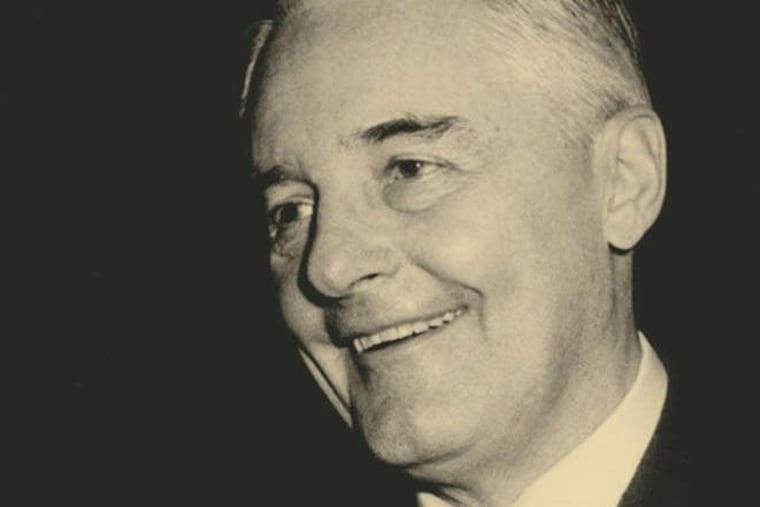Colorful account of Dilworth, a blue-blood brawler
Richardson Dilworth - former Philadelphia mayor, district attorney, and school board president - has been dead since 1974. But his accomplishments inform what Philadelphia is, and is not, today.

Richardson Dilworth
Last of the Bare-Knuckled Aristocrats
By Peter Binzen and Jonathan Binzen
Camino Books. 240 pp.
nolead ends nolead begins
Reviewed by Steve Weinberg
Richardson Dilworth - former Philadelphia mayor, district attorney, and school board president - has been dead since 1974. But his accomplishments inform what Philadelphia is, and is not, today.
With this vivid biography of Dilworth by long-time Philadelphia journalist Peter Binzen and Binzen's son Jonathan, Dilworth all but rises from his grave.
The subtitle of the biography, which will be published Friday, is fascinating, and apt. Reared as a gentleman and married into society, Dilworth was nonetheless a fighter - literally, serving as a Marine in both World War I and World War II, and figuratively, as he attacked political opponents relentlessly.
Dilworth, a loyal member of the Democratic Party at a time when the Republican Party dominated Philadelphia, would publicly raise scurrilous allegations against Republicans who stood in his way. Sometimes, Dilworth verbally attacked noncompliant Democrats as well. Many of the charges hurt because they conveyed the truth about Dilworth's opponents. But if Dilworth decided to win on election day, lying about his opponents seemed like a reasonable option.
Peter Binzen meant to publish Dilworth's biography decades ago, especially after conducting in-depth interviews with the former mayor in 1972. Binzen had written about Dilworth regularly during the 1960s while covering education for the Bulletin. But Binzen filed away the interview tapes and became immersed in other wordsmithing. He retrieved the tapes during 1989 when Inquirer editors asked him to compose a Dilworth profile for the newspaper's Sunday magazine.
The magazine profile led Ed Jutkowitz at Camino Books in Philadelphia to suggest a full-length biography of Dilworth to Binzen. Binzen said yes, and now the book is a reality, thanks to the research and editing intervention of Jonathan Binzen. In addition to relying on the transcribed interviews, Dilworth's official papers at the Free Library of Philadelphia plus other documents at the Historical Society of Pennsylvania, the co-authors received insights from Dilworth's son, daughter, and stepson.
Given the book's provenance, it could easily have become a hagiography. Yes, it seems clear that Peter Binzen admires Dilworth. That said, the biography contains plenty of digging into Dilworth's quirks and outright shortcomings. The coauthors provide a detailed account of a scandal that grew out of "extensive repairs to the Frankford elevated rail line" during Dilworth's second term as mayor and "tarnished" his administration. The firm hired to do the work "completed only a portion of the repairs but presented a bill for the full amount, defrauding the city of more than a million dollars." Dilworth conceded in his 1972 interview with Peter Binzen that his administration had become "sloppy" on details of certain projects.
After a career as a successful Philadelphia lawyer that began in 1926, Dilworth could have led a comfortable, predictable life. He probably could have avoided service in World War II, after having served valiantly during World War I. In politics, Dilworth decided to shed comfort by seeking the office of Philadelphia district attorney in 1951, despite a Republican stranglehold on that post and just about every other elective position. Dilworth won, playing a key role in the surprisingly quick crumbling of the Republican Party dynasty in Philadelphia. The Democratic Party dynasty had begun, and continues.
Although partisan politics mattered to Dilworth, his political career exuded substance. His ideas for reforming mass transportation in Philadelphia made a significant difference. His ideas for reforming the public school system took hold, to the benefit of untold thousands of students and their families. His refusal to award important city jobs as patronage during his years as mayor improved the quality of the civil service. He used diplomacy in an effort to improve race relations throughout the neighborhoods. He played a major role, according to the Binzens, of "[sparking] the development of what became the nation's most successful urban renewal effort," the rejuvenation of Philadelphia's Society Hill residential area.
The discussions of public policy throughout the biography resonate with detail, and ought to prove educational to any Philadelphian, any Pennsylvanian, who wants to understand how the not-so-distant past gave rise to the present.
The most powerful portions of the biography, however, portray the dynamism of Dilworth. Love him or hate him, he was outrageously interesting. Let's turn this review over to the coauthors for a dollop of description:
" . . . there was an Old World chivalry about Dilworth that friends found beguiling . . . . Those who campaigned against Dilworth, however, didn't find him either gentle or mannerly. Often angry, sometimes wrong, he never shied away from a fight or ducked an issue."
Thacher Longstreth, who opposed Dilworth for mayor in 1955, provided the subtitle to the biography by calling him "the last of the bare-knuckled politicians." County commissioner Mort Witkin called Dilworth "crazy as a bedbug - with apologies to the bedbug." Dilworth's hatred for Frank Rizzo as Rizzo rose to the top of the Philadelphia Police Department was palpable. The biography contains spellbinding sections recounting the Dilworth-Rizzo feuding.
The Binzens remark that "Few politicians have ever served Philadelphia with such passion." That passion makes the recounting of Dilworth's life especially memorable.